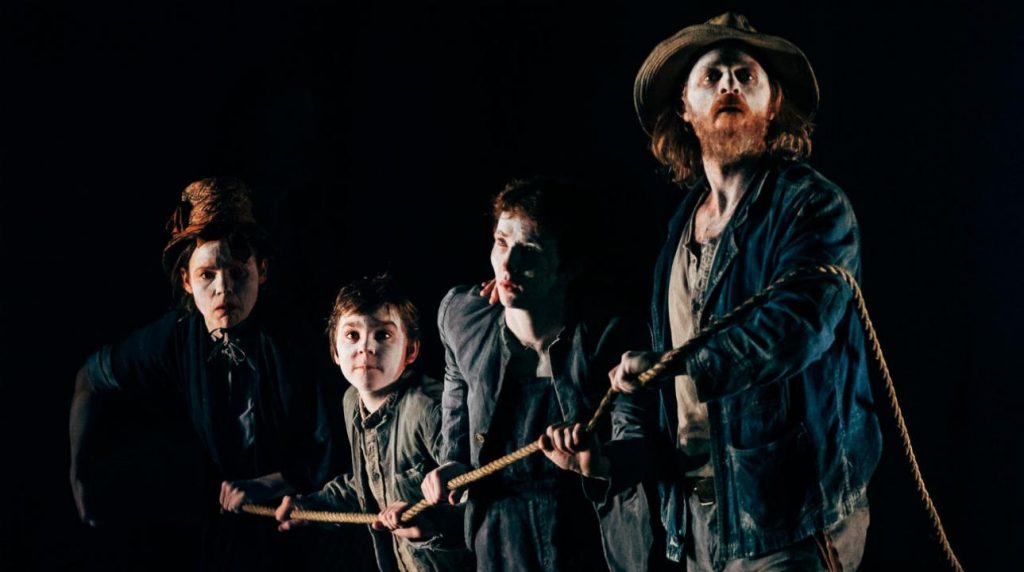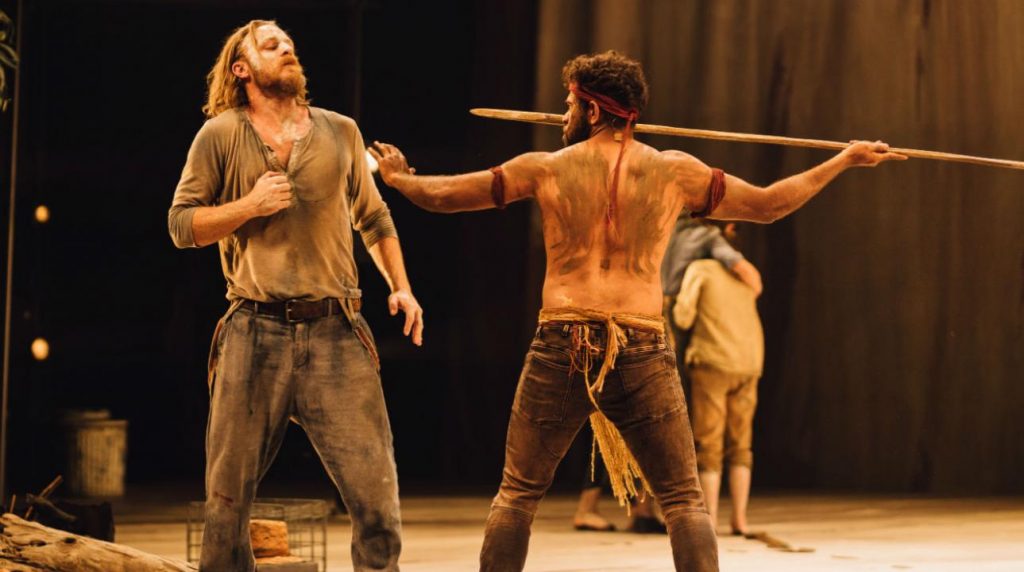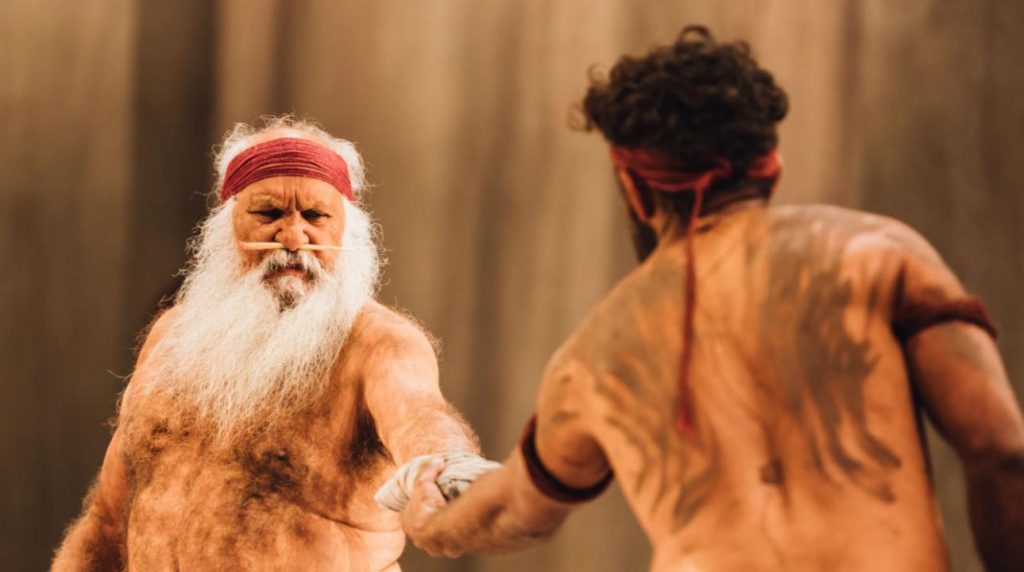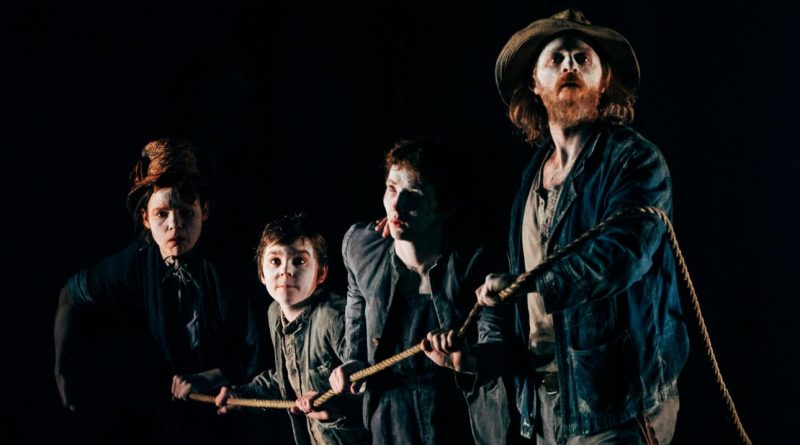Review: The Secret River, Olivier Theatre (National Theatre)
by Adrian Gillan for www.bent.com
Two families, one continent, as past flows into present! Bent’s Adrian Gillan is rocked by Sydney Theatre Company’s potent account of The Secret River, hosted at the National Theatre, London!
Sometimes you have to open old wounds to heal them. And we can only analyse our present and shape our future if we acknowledge and understand our oft painful past. Few pasts have been as supressed or as painful or bloody as that of Australia; few overseas stages more apt, for the telling, than a British one.

Kate Grenville’s acclaimed 2005 novel, The Secret River, pulls no punches in its handling of Australia’s dark and, until recent decades, largely kept-secret history. And Andrew Bovell’s 2013 theatre adaptation firmly removes any gloves, rebalancing even more fairly towards a First Nations perspective than the original book; the play given a guts-and-all rendering in this award-winning production from Sydney Theatre Company, hosted by the National Theatre in London, following a stint up in Edinburgh.
This truly epic tale explores what happens then two families, divided by cultures, meet and collide – over land. An intimate human flashpoint tells the story of an entire continent; and of colonialism and buried histories more generally – all the more shocking since the atrocity is conducted not by ogres, but by real people, not so unlike you or I. Conceived in collaboration with Aboriginal artists and performed partly in Dharug as well as in English, a sizeable, genuinely ensemble cast – many doubling up roles – use both naturalistic and stylised means to powerfully poetically convey events on the largely bare Olivier stage.
Neil Armfield’s direction of Bovell’s fine adaptation spellbinds, hooking us into the complex web of character relationships, as the grand – indeed arguably still ongoing – tragedy unfolds. The menacingly dramatic tension builds unbearably, especially post-interval, so the evening’s 2 hours 50 minutes vanish. Themes include ownership v. stewardship; forced v. natural destiny; home, identity and belonging; male chauvinism and fear-fuelled tribalism; class and social mobility; guilt and redemption – to name a few!

Taking over at short notice – following the sad, sudden, unexpected death of cast member Ningali Lawford-Wolf whilst up in Edinburgh – Pauline Whyman hauntingly plays the anchor role of Dhirrumbin, the dignified prophetic narrator who advances, and comments upon, the action throughout.
A New South Wales convict, transported with his family from the slums of London, William Thornhill earns his pardon and lays claim to a stretch of land he might, for the first time, dare to call his own – until he meets its ancient custodians, the Dharug people!
Nathaniel Dean wonderfully portrays William Thornhill as loving husband and father, striving to improve the status and prospects of his family – despite doting wife Sal (Georgia Adamson, excellent) overcoming fear to exchange hospitality with Dharug women and younger son Dick (Toby Challenor, innocent and playful) befriending Dharug children. Rory Potter is superb as older son, Willie, torn yet always loyal to his father.
Amongst the other white immigrants, Joshua Brennan is cheeky as William’s childhood friend, now status-enhancing servant, Dan Oldfield; and Melissa Jaffer is earthy and pragmatic as worldly old nurse, Mrs Herring. Colin Moody, as loner Thomas Blackwell, integrates and starts a Dharug family, ultimately felled alongside his new-found community on the dreadful day of slaughter that is wrought by fellow, yet non-integrating, settlers – hateful and well-nigh animalistically violent Smasher Sullivan (Jeremy Sims, terrifying); dandy Loveday (Bruce Spence, vainly genteel); and crony Sagitty (Matthew Sunderland).
William Thornhill repeatedly comes up against Yalamundi (played with great dignity and knowing stoicism by Major ‘Moogy’ Sumner AM) and is increasingly irritated, yet also beguiled, by his family’s growing interaction, and friendship, with Dharug folk – notably Buryia (Elma Kris, oft comic); Garraway (an energetic, exuberant young Wesley Patten, the night I saw it); youthful Narabi (handsome Dylan Miller) and nubile Gilyagan (Dubs Yunupingu, brilliant) – alongside rougher tense encounters with headstrong warriors Ngalamalum (Shaka Cook) and Wangarra (Marcus Corowa).

Onstage throughout, and integral to the entire piece, Musician/MD Isaac Hayward performs composer Iain Grandage’s oft elegiac score (additional music by Trevor Jamieson) on multiple instruments, with further live music and sound effects conjured, at times, by the ensemble cast.
A blank canvas for the drama’s fluid imaginings, Stephen Curtis’ design involves a spartan sand-dusted space in front of vast drapes upon which actors’ shadows are occasionally projected, all made by degree intimate and expansive by Mark Howett’s lighting, complimented by Steve Francis’ sound, and by Tess Schofield’s costumes which pack a powerful spine-shivering contemporary punch in the very final scene, as settlers’ and First Nations’ descendants briefly appear in modern dress, the former’s guilt-ridden privilege and the latter’s continued disadvantage a present-day reality, by direct line.
Raves, too, for voice/text coach Charmian Gradwell and language consultant Richard Green, for so well conveying the fascinating vocal evolution of accent between England and Australia; and for Scott Witt’s fight direction in a work bristling with violence, both realistic and stylised. Pure, crucial, epic drama. See.
The Secret River runs at the Olivier Theatre (National Theatre) in London until 7 Sept 2019.
– ends –

